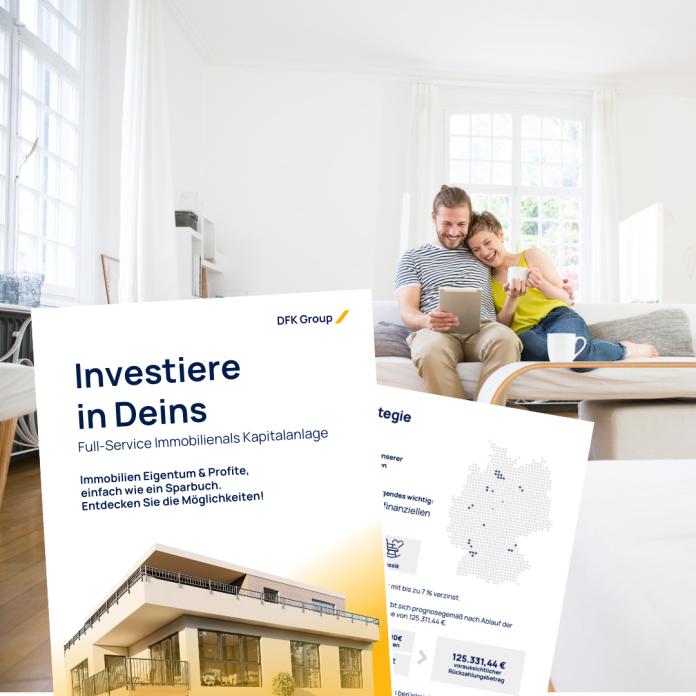How it can be calculated and why it is so important for a real estate investment.
“Taxes” – the word alone gives many people a cold shiver on their backs. Although the topic affects almost everyone and is therefore important, it is a tiresome topic for most people. The reasons for this are simple: the tax system is too complicated, opaque and incomprehensible. However, it is a prejudice that taxes only have disadvantages. For example, in the area of real estate investment, the tax can be used very well, especially in the initial phase, to allow the state to participate in its own investment. The tax saving potential is an important factor, especially in the current times with high interest rates and increasing percentages of depreciation for rental properties.
Individual case is decisive
How high a tax advantage actually is depends on the individual requirements for calculating the tax in each individual case. Therefore, the numbers mentioned in this article can only serve as a non-binding example. For the following considerations, the exemplary initial values apply, as listed in the box.
Presented in simplified terms
Even if it is only an approximation of the true results, it can be put simply: With a tax rate of 42 percent, every euro spent results in a tax saving of around 42 cents. Conversely, every euro of income results in a tax burden of 42 cents. With a tax rate of 30 percent, this would be 30 cents per euro. The most important starting point for calculating a tax advantage as part of a real estate investment is the difference between income and expenses, which is usually the loss in the beginning. Especially in the initial phase, expenses usually exceed income.
revenue
In the example, with a monthly rent of 300 euros per year, the income is 3,600 euros.
expenditure
The tax-relevant expenses consist of loan interest, additional costs and depreciation on the building. Since the loan is a so-called annuity loan, the interest amounts reduce year after year. At the beginning, the annual burden is around 3,963 euros. The depreciation is 2 percent of 100,000 euros per year, i.e. 2,000 euros. For a new building after January 1, 2023, it would even be 3 percent or 3,000 euros. Last but not least, there are additional costs that cannot be passed on to the tenant. In the example, these cost 960 euros per year.
calculation
The next step is to add up the income on one side and the expenses on the other. In the example for the first year there are 3,600 euros on the income side and 6,923 euros on the expenses side. This results in a tax loss of 3,323 euros in the first year. This is multiplied by the personal tax rate to determine the annual tax savings. In the example this results in around 1,395 euros. Spread over twelve months, this effectively reduces the burden on the monthly budget by around 116 euros. On average, due to the falling interest burden over the first ten years, there is a monthly relief of around 106 euros per month. These sums are actually saved through the investment and therefore do not have to be paid to the tax office. For the sake of completeness, however, it should be mentioned that the amount saved only takes effect with the income tax assessment for the past year.
Where can I find something?
Since some numbers are necessary to calculate the tax advantage, here is a brief overview of where they can be found: The monthly Cold rent is noted in the rental agreement. The Purchase price of a property can be found in the offer or in the purchase contract. The additional costs that cannot be allocated are usually included in the property management's utility bill. On the other hand, the depreciation some arithmetic required. This results from the purchase price including additional costs, excluding the land share, multiplied by the depreciation rate of 2 percent or, for newly built rental residential buildings after January 1, 2023, 3 percent. About the personal tax rate There are several ways to find out. The first point of contact, if available, is the tax advisor. Tax programs also often provide the average tax rate. The last option is to determine the tax rate yourself. This requires the taxable income from the last tax assessment. This allows you to read the tax rate in the income tax table (basic table for single people, splitting table for married couples). What is important is: The average tax rate is crucial for the calculation. The marginal tax rate is irrelevant.
Initial values:
Purchase price apartment: 100,000 euros
(excluding the share of land, including additional purchase costs)
Loan amount: 100,000 euros
Loan interest rate: 4%
Repayment rate: 2%
Rental income pa: 3,600 euros
Depreciation rate: 2%
Additional costs pa: 960 euros
Tax rate: 42%
Annual gross salary: 80,000 euros
Calculation:
Revenue:
Rent + 3,600 euros
Expenditure:
Depreciation – 2,000 euros
Interest (1st year) – 3,963 euros
Additional costs – 960 euros
Loss – 3,323 euros
Tax rate x 42%
Tax advantage (1st year) 1,395 euros


